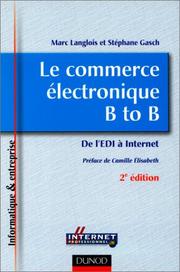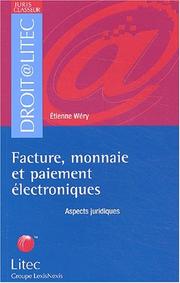| Listing 1 - 10 of 32 | << page >> |
Sort by
|
Book
ISBN: 1880446979 9781880446973 Year: 1998 Publisher: Berkeley: Usenix,
Abstract | Keywords | Export | Availability | Bookmark
 Loading...
Loading...Choose an application
- Reference Manager
- EndNote
- RefWorks (Direct export to RefWorks)
Business --- Electronic data interchange --- Gestion --- Échange électronique d'information
Book
ISBN: 2894511302 9782894511305 Year: 1996 Publisher: Blais,
Abstract | Keywords | Export | Availability | Bookmark
 Loading...
Loading...Choose an application
- Reference Manager
- EndNote
- RefWorks (Direct export to RefWorks)
Book
ISBN: 9798675589012 Year: 2020 Publisher: [Place of publication not identified] : Independently Published,
Abstract | Keywords | Export | Availability | Bookmark
 Loading...
Loading...Choose an application
- Reference Manager
- EndNote
- RefWorks (Direct export to RefWorks)
This book shows in a practical way how to set up cybersecurity in an organisation, guided by the most critical business needs.The relationship between the mission critical business processes and the IT infrastructure is first modeled, using modelling languages that ensure a common understanding among the different stakeholders.Next the cyberthreats against the information systems and services are identified using a combination of methods, and the resulting risks are assessed and managed.An entire chapter is dedicated to solutions for mitigating the risks, from high level policies down to network architectures and components.Since incidents will occur the concept of designing cyber resilient solutions is presented, with a focus on managing incidents.Finally cybersecurity governance is discussed, together with a skills framework, and the use of cyber trainings.
Computer security --- Electronic data interchange --- Sécurité informatique --- Échange électronique d'information --- Security measures. --- Sécurité --- Mesures
Periodical
Abstract | Keywords | Export | Availability | Bookmark
 Loading...
Loading...Choose an application
- Reference Manager
- EndNote
- RefWorks (Direct export to RefWorks)
Banks and banking --- Electronic data interchange --- Banques --- Échange électronique d'information --- Automation --- Data processing --- Automatisation
Book
ISBN: 188044674X 9781880446744 Year: 1995 Publisher: Berkeley: Usenix,
Abstract | Keywords | Export | Availability | Bookmark
 Loading...
Loading...Choose an application
- Reference Manager
- EndNote
- RefWorks (Direct export to RefWorks)
Business --- Electronic data interchange --- Gestion --- Échange électronique d'information --- Data processing --- Congresses --- Informatique --- Business - Data processing - Congresses --- Electronic data interchange - Congresses --- Gestion - Informatique - Congrès --- Échange électronique d'information - Congrès
Book

ISBN: 9782849343104 2849343102 Year: 2017 Publisher: Paris : Mare & Martin,
Abstract | Keywords | Export | Availability | Bookmark
 Loading...
Loading...Choose an application
- Reference Manager
- EndNote
- RefWorks (Direct export to RefWorks)
La vague d'attentats terroristes qui se sont succédés en Europe depuis novembre 2015 a révélé des lacunes dans l'échange de données policières au sein de l'Union européenne. Pourtant, les dispositifs d'échange de données au sein de l'Union sont nombreux et perfectionnés. L'objet de cet ouvrage est d'analyser le fonctionnement des différents mécanismes existants permettant l'échange d'informations, non seulement entre les autorités policières, mais d'une manière plus large dans le cadre de l'Espace de liberté, de sécurité et de justice de l'Union européenne. Il convient à cette occasion de réfléchir à l'efficacité des systèmes existants afin de pouvoir identifier des moyens d'améliorer leur fonctionnement et surtout leur utilisation effective par les autorités compétentes. Le second volet de la réflexion consiste à mettre en exergue les contraintes en matière de légitimité qu'implique l'échange d'information au sein de l'Espace de liberté, de sécurité et de justice. Les données échangées sont souvent des données sensibles dont le traitement peut porter atteinte à la vie privée. Le droit à la protection des données à caractère personnel dans ce domaine a une importance particulière, mais subit aussi des limitations qu'il convient d'identifier et éventuellement de justifier.
Entraide judiciaire européenne --- Échange électronique d'information --- Sécurité internationale --- Union européenne --- Protection de l'information (informatique) --- Droit européen --- Union européenne. --- Entraide judiciaire européenne. --- Échange électronique d'information. --- Sécurité internationale. --- Droit européen. --- Union européenne.

ISBN: 2100055313 9782100055319 Year: 2001 Publisher: Paris: Dunod,
Abstract | Keywords | Export | Availability | Bookmark
 Loading...
Loading...Choose an application
- Reference Manager
- EndNote
- RefWorks (Direct export to RefWorks)
Commerce électronique --- Commerce interentreprises --- Echange electronique d'information --- Internet --- Aspect économique --- Marketing industriel --- Internet - Aspect économique --- Edi
Multi
ISBN: 9782931051191 Year: 2019 Publisher: Liège CIRIEC international
Abstract | Keywords | Export | Availability | Bookmark
 Loading...
Loading...Choose an application
- Reference Manager
- EndNote
- RefWorks (Direct export to RefWorks)
Abstract: Creating a new commons for agricultural cooperatives: Big data, ICT and data sharing (English title) The utilisation of Big Data and ICT technologies on a large scale in agriculture is seen to be a solution for dealing with climate change, environmental degradation, land and water constraints, the necessity to optimise resources, reduce costs, and increase traceability and food safety, amongst other compelling arguments. However, it has also resulted in imbalances in power, investment barriers, reduced access to knowledge and the decreasing ability of farmers and SMEs to control and benefit from their agricultural related activities. This paper considers the legal, governance, institutional and economic issues that may arise in developing a data cooperative or other equitable data sharing structures, taking into account public and private sources of data, and multi-stakeholders involved. A review of successful data sharing examples, including cooperatives, is presented and a test case from the cooperatives of Almería, Spain is considered. This research falls within the context of the EU H2020 project Internet of Food and Farm (IoF2020) and the development of innovative data sharing business models. Rather than falling back on classical contracting arrangements for data sharing, as proposed by Copa-Cogeca, amongst others, it is proposed that a “data commons” approach in keeping with Elinor Ostrom’s SocialEcological Systems Framework be used to frame a cooperative solution to this complex, systems based, challenge. By choosing a cooperative approach, benefits to farmers may go beyond “monetization” of data, and contribute to safeguarding environmental goods.
Agriculture [Cooperative ] --- Landbouw --- Automatisering --- Spanje --- Échange électronique d'information. --- Données massives. --- Partenariat public-privé. --- Produits agricoles --- Vente coopérative.

ISBN: 2711135152 Year: 2003 Publisher: Paris : Litec,
Abstract | Keywords | Export | Availability | Bookmark
 Loading...
Loading...Choose an application
- Reference Manager
- EndNote
- RefWorks (Direct export to RefWorks)
Electronic commerce --- Invoices --- Electronic funds transfers --- Commerce électronique --- Factures --- Monnaie électronique --- Law and legislation --- Droit --- Commerce électronique --- Monnaie électronique --- Échange électronique d'information --- France
Book
ISBN: 9781784051907 Year: 2017 Publisher: Londres : ISTE éditions,
Abstract | Keywords | Export | Availability | Bookmark
 Loading...
Loading...Choose an application
- Reference Manager
- EndNote
- RefWorks (Direct export to RefWorks)
Le recours aux nouvelles technologies qui garantissent la protection et la sécurité du citoyen instaure un climat de suspicion et d'oppression qui aboutit souvent à l'éradication des libertés. Dans la lignée de Jacques Ellul, Les enjeux de la société de contrôle à l'ère du numérique tente de démontrer comment les technologies du XXIe siècle – interceptions, vidéosurveillance, procédés biométriques, scanner – instaurent progressivement une société de contrôle. Il s'agit de comprendre les enjeux reposant sur les différents acteurs (états, multinationales, citoyens) dans ce contexte où l'équilibre « sécurité/libertés » semble pencher en faveur de la sécurité. Cet ouvrage retrace l'évolution diachronique du dialogue ordre public/respect des droits fondamentaux en analysant le temps de la conciliation, du conflit puis du tout sécuritaire. Dans une approche empirique, il explore la thématique juridique, politique et idéologique à travers la jurisprudence sur la protection des droits de l'homme et des données à caractère personnel.
| Listing 1 - 10 of 32 | << page >> |
Sort by
|

 Search
Search Feedback
Feedback About UniCat
About UniCat  Help
Help News
News